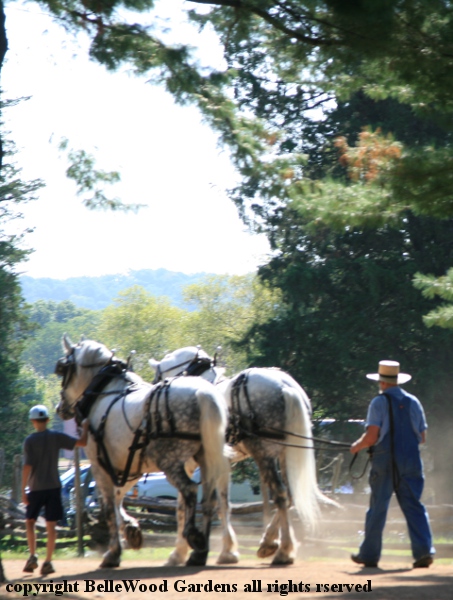
.
If you have any comments, observations, or questions about what you read here, remember you can always Contact Me
All content included on this site such as text, graphics and images is protected by U.S and international copyright law.
The compilation of all content on this site is the exclusive property of the site copyright holder.
Today we're joining a couple of friends at the Mercer County Park Commission's Howell Living History Farm. Managed as it would have been around 1900 horses and oxen provided the farm's "horse power." Today we're going there for a plowing match. Teams of draft horses from New Jersey and Pennsylvania will compete. Plowing sections called "lands" they will be judged on the following details: the condition of their team and its equipment, the teamster's control of their team, the evenness and straightness of the furrow, evenness of the ends, depth of furrow and coverage of trash and debris.
The seasons have their cycles. It may not yet be the astronomical start of autumn (that comes later in September) but it is the proper season begin preparing the fields for sowing winter wheat. First the ground is plowed with moldboard plows where a curved section (the plow share) turns over the ground so a slice of soil covers weeds and crop debris. Next the ground is rolled, then harrowed (in several directions), and finally leveled with a plank drag. Which is why the plowing match is held this early in September, even though the wheat will not be sown until early October.
Teamsters and their teams arrived earlier this morning. Trucks and horse trailers are parked in the Round Pasture. Horses are unloaded, cleaned up, and harnessed. Then the teams will walk up to the East Crop Fields. Contestants can ground-drive their horses as a warmup for the plow match, and the four judges will have a meeting.

Daniel Ruth from Teleford, Pennsylvania is taking Ted and Bud, his Percheron team, up to the East Crop Fields, assisted by his grandson. Pat Hlubik from New Egypt, New Jersey has Ike, Jed, and Jethro, a three-horse hitch of Brabants. Sometimes referred to as European Belgians, the Brabant is a heavier, stockier breed than the Belgians favored here in the United States.
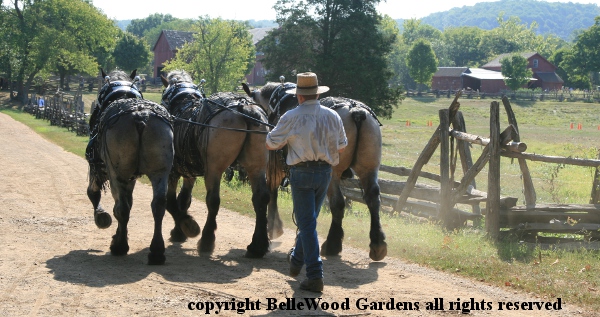
.
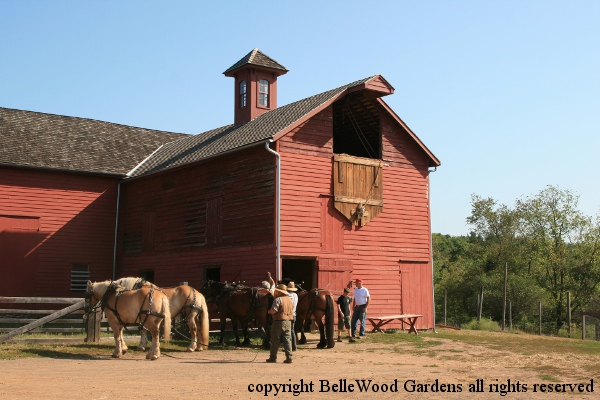
A couple of teams pause at the barn. The honey colored Belgians
on the left are a team of Howell Living History Farm's work horses.
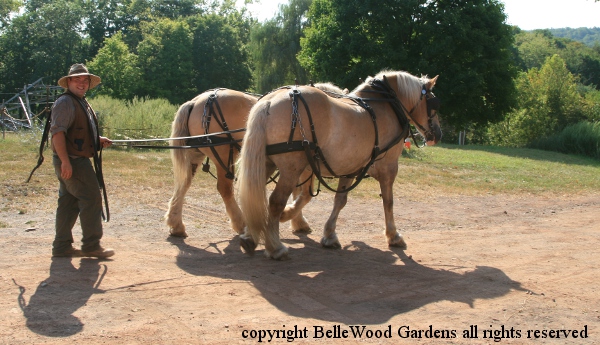
But they're now on the way to the East Crop Fields too.
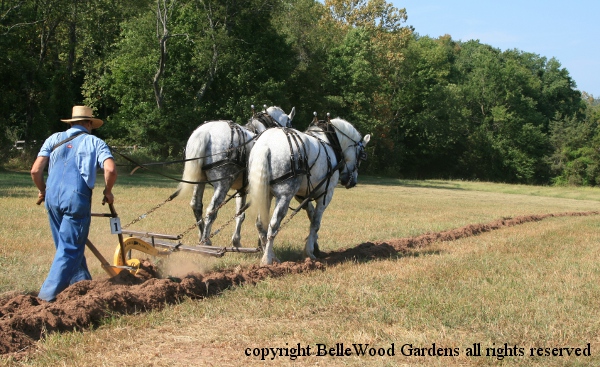
The plowing match begins. Ted and Bud are plowing their second furrow. Daniel told me that he has some left hand plows, and others that are right handed. One of his team is a better "furrow" horse, more willing to walk down in the previous furrow. So depending on which handed plow he is using it will influence Ted and Bud's orientation in the hitch.
The weather has been very dry lately, and that has an effect on the how well the debris is buried by the plowshare. There's some grass clumps sticking up here and there. But, Daniel said, given the conditions he's satisfied with it. And at least there weren't any rocks, to speak of.
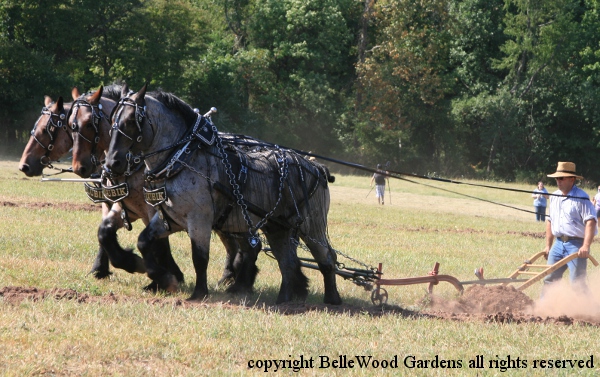
Brabant are a very muscular breed, especially as seen from the rear! The amazing thing, to me, is that these are stallions. Speaks highly to their level of training and calm temperament.
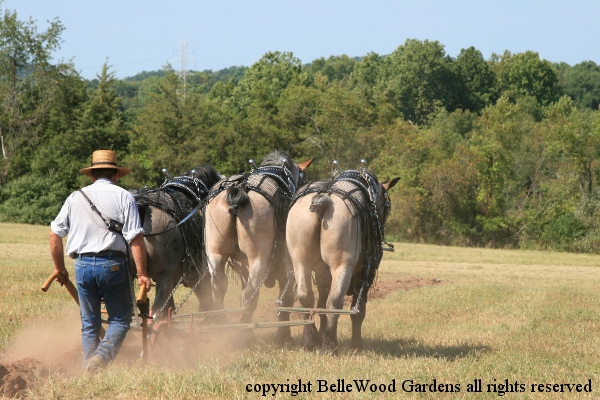
.
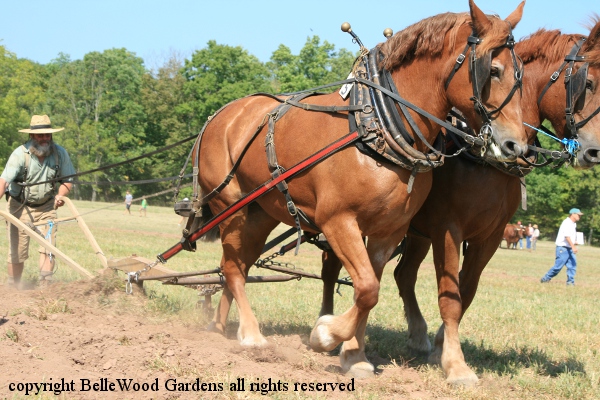
A beautiful pair of Suffolk Punch, stepping out. Scott Stephens from Brodheadsville, Pennsylvania brought his work horses, May and June. He uses the team for logging, and also has a sawmill.
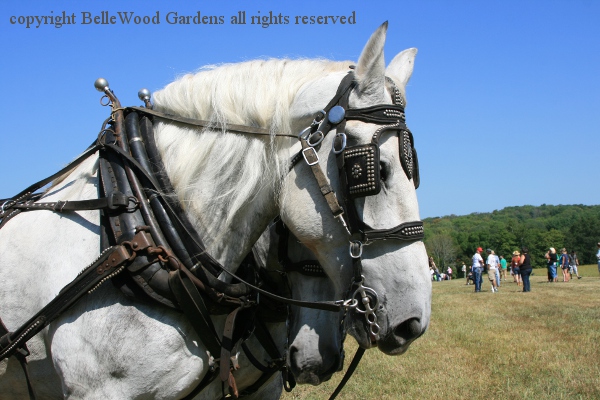
Match plowing is over. Horses and teamsters are taking a break, just standing around. Here's a nice closeup of Ted. Or is it Bud . . . . Daniel would know but I'm afraid I cannot tell them apart. Now that they are older, about 12 years old, their dapples are fading with each shedding out. Makes them harder to keep clean, says Daniel.
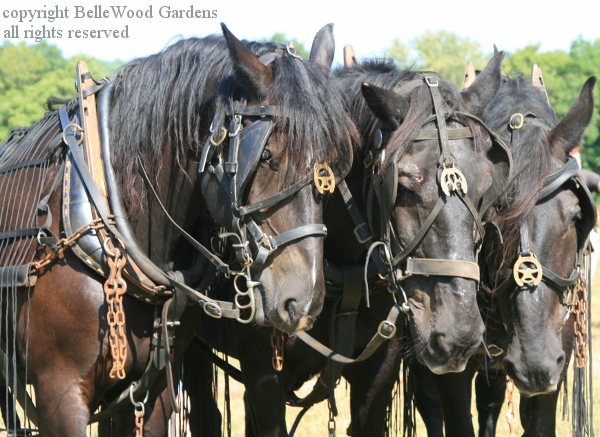
From Stockton, New Jersey. Mary Tolmie's black Percheron mares - Lorrie, Shiela, and Nika - take a quiet look at the passing parade of visitors. The thin straps you see to the left are part of a leather strip fly net. These days they're old fashioned, even quaint. Today, horses have nylon fly sheets and face masks. But I don't see how a draft horse could be harnessed up for work, wearing something of that sort.
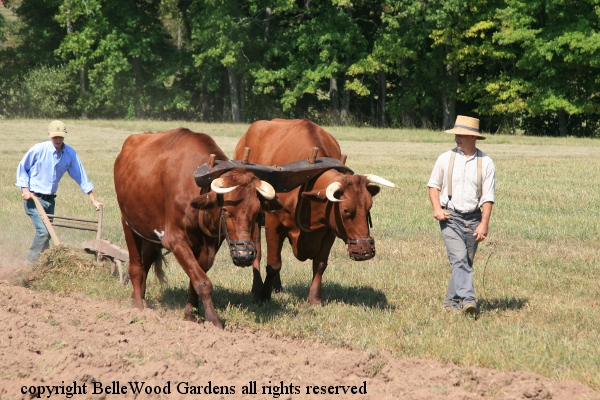
Here are Jim and John, the Howell Farm's team of Milking Shorthorn oxen. Rob Flory is the teamster, and Alex Amador the plowman, a United States Peace Corps volunteer. Skills he is learning at Howell Farm will be useful helping Cameroon farmers improve their crop production.
The morning's event is over. Time for lunch. Your choice of modestly priced delicious pulled pork sandwiches from a barbecued pig, or barbecued chicken, or hot dogs, with sides of baked potato, corn on the cob, or fresh tomato salad. For dessert, there's freshly made ice cream with a diversity of flavors. The five of us find a picnic table in the shade and chow down.
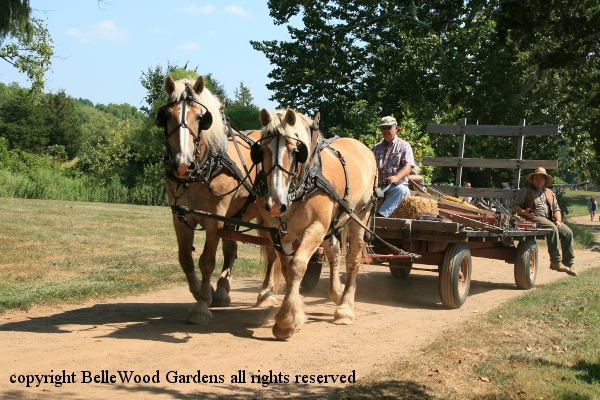
Hitched to a buckboard, Howell's Belgians bring all the plows down from the field.
There's an afternoon event, an obstacle course where each team of draft horses must pull a log through a series of obstacles and turns. But it is time for us to leave, so accompanied by the background music of the Jugtown Mountain Band we say goodbye to each other, agreeing to meet up again next year, for the plowing match at Howell Living History Farm.
Back to Top
Back to September 2015
Back to the main Diary Page